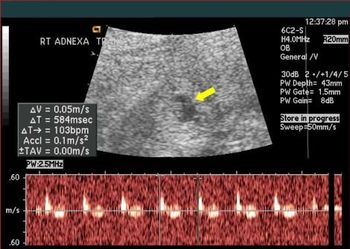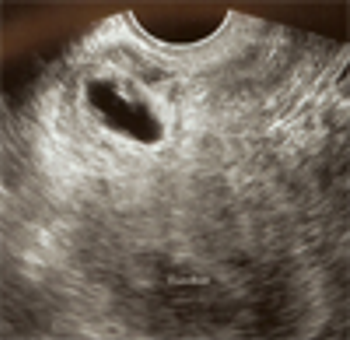
Three-dimensional ultrasound (3D US) is a new imaging modality, which is being introduced into clinical practice. Although this technique will not probably replace two-dimensional ultrasound, it is being increasingly used.

Three-dimensional ultrasound (3D US) is a new imaging modality, which is being introduced into clinical practice. Although this technique will not probably replace two-dimensional ultrasound, it is being increasingly used.

A 29-year-old gravida 10, para 3 (1 term gestation, 1 preterm gestation of twins, 1 stillbirth at 5 months, 2 spontaneous abortions, and 4 elective abortions) presented to the clinic at about 5 weeks’ gestation with abdominal pain and vaginal bleeding. She described the pain as sporadic, mostly on the left side, exacerbated by movement, and resolving with rest, and the bleeding as initially intermittent but then heavier “like a period.”

Implantation in the scar of a previous Cesarean is thought to be the rarest of ectopic pregnancies. With the increasing numbers of Cesareans performed, scar implantation may become more frequent as well. We present an illustrative case.

Clinicians and researchers have seen an increase in the prevalence of gastroschisis, with the greatest risk seen in women who are younger than 20 years. That, coupled with an evident increase in developing countries, has led researchers to believe that gastroschisis is associated with environmental factors (with or without underlying genetic susceptibility).

Persistent infection with HPV is the principal cause of cervical cancer, with HPV implicated in more than 99% of cervical cancer cases worldwide.1 The cobas HPV (human papillomavirus) Test, recently approved by the FDA, identifies women at highest risk for the development of cervical cancer.

Varying risks and benefits are associated with cesarean deliveries as compared to vaginal deliveries, including the impact on the mother’s health and the infant’s health. Ultimately, the goal is to deliver the baby the safest way possible for both mother and baby, but does the mode of delivery significantly impact the health-related quality of life in the immediate postpartum period through the first year after childbirth?

Pelvic pain and urinary symptoms can present following delivery, but how does delivery method impact these symptoms? Dr Daniel G. Kiefer, physician in the division of maternal-fetal medicine/obstetrics in Lehigh Valley Health Network in Allentown, Pennsylvania, and colleagues conducted a prospective observational cohort study to further explore this question.

Uterine fibroids that are completely or partially inside the cavity of the uterus (submucous myomas) can often be removed through the cervix by using an instrument called a resectoscope.

The American College of Obstetricians and Gynecologists recommends that women begin Pap test screening at 21 years, but are there certain circumstances in which Pap tests are warranted at younger ages? Dr Amy M. Johnson of Hartford Hospital in Connecticut and colleagues hypothesized that teenage girls who engage in risky behaviors would benefit from early initiation of cervical screening.

Intrauterine devices (IUDs) represent a safe and effective option for preventing unwanted pregnancies. Yet studies have shown that gynecologists still have concerns over its safety and do not utilize evidence-based criteria to assist in the selection of IUD candidates. In order to overcome this obstacle, it is imperative that current obstetric and gynecology residents are receiving correct information on this treatment modality-but are they?

Advances in successful assisted reproductive technologies have enabled clinicians to further aid their patients who would otherwise be unable to conceive. However, little is known about this trend and its continued future growth.

Despite great advances in maternity care, the number of women who give birth to infants requiring special care is still high. The Centers for Disease Control and Prevention’s National Preconception Health Plan has called for care to ameliorate health problems, support pregnancy spacing, and improve future birth outcomes in those women with a previous adverse pregnancy outcome

Should I have my fibroids removed before I try to get pregnant? That is one of the most difficult questions I have to answer! Here is what we know.

A recent study found that women with gestational hypertension are not receiving appropriate follow-up care and prevention. Specifically, the researchers found that women with gestational hypertension were less likely to have their blood pressure checked within the previous 2 years and were less likely to have their blood cholesterol checked within the previous 4 years.

As clinicians and patients strive to find oral contraceptives that are safe and effective, newer varieties have emerged on the market. Venous thromboembolism, an adverse event that has been associated with third-generation oral contraceptives, is a serious concern, especially with the growing popularity of these newer contraceptives.

Emergency care in obstetric practice is fraught with medico-legal risk. This is especially true when the practitioner has no established relationship with the parturient and either mother or child sustains serious or permanent injury during the birth process. Although reform efforts have been proposed expanding limits to liability in certain settings where emergency care is provided, currently, obstetricians often must rely on the protection afforded by their respective state’s Good Samaritan statute.

Hypertension affects as many as 8% of all pregnancies. Not only does it pose complications during pregnancy, but even if it resolves after delivery, it places women at increased risk for cardiovascular disease. As such, these women should receive cardiovascular disease counseling and screening, including the monitoring of their blood pressure and cholesterol levels, implementation of lifestyle modifications, and awareness of heart attack symptoms.

Insulin resistance in pregnancy poses risks for the mother, including preeclampsia and many other pregnancy-related complications. In this editor’s choice article-fast-tracked for publication in the American Journal of Obstetrics and Gynecology due to its clinical importance-researchers explored the association between increased maternal midtrimester insulin resistance and subsequent preeclampsia.

This young adult female (22 years age) had no significant complaints and was referred for a routine ultrasound scan of the abdomen to rule out any pathology. She complained of minor thyroid complaints, and ultrasonography suggested presence of Hashimoto’s thyroiditis in this lady.

Chronic hypertension plagues as many as 5% of pregnancies and can result in such adverse perinatal outcomes as preterm birth and fetal death. Further complications can present among women with chronic hypertension who develop superimposed preeclampsia, yet data on perinatal outcomes for such women are sparse.

Spontaneous preterm birth, the most common cause of premature birth, results from a multifactorial process. Its etiology is unknown, which makes it difficult to treat. In addition, there are few proven preventive measures.

Increases in the prevalence of asthma, especially in children, have raised concern in the medical community, resulting in research to find possible causes and to explore potential means of prevention. Recently there has been some evidence linking acetaminophen (known as paracetamol in New Zealand) use in pregnant women and subsequent increased risk for asthma in their offspring.

A 37 year old woman came to me in July, 2009 with a prolapsing 8 cm. fibroid. She had been seen by her HMO doctors multiple times for heavy bleeding, had 15 ultrasounds, but nothing was done.

Infertility is the inability to conceive despite frequent and unprotected intercourse between a man and his female partner for at least 1 year.

I believe epidurals are overused in obstetrics because not enough women receive hands-on labor support, and the side effects and risks are not well described to women.